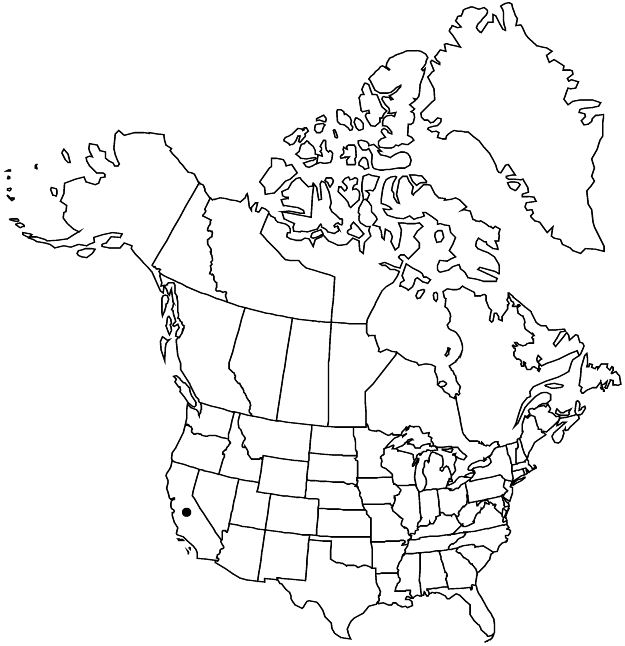Difference between revisions of "Ceanothus oliganthus var. sorediatus"
Leafl. W. Bot. 10: 349. 1966.
FNA>Volume Importer |
imported>Volume Importer |
||
| (6 intermediate revisions by 2 users not shown) | |||
| Line 12: | Line 12: | ||
|label=Endemic | |label=Endemic | ||
}} | }} | ||
| − | |basionyms={{Treatment/ID/ | + | |basionyms={{Treatment/ID/Basionym |
|name=Ceanothus sorediatus | |name=Ceanothus sorediatus | ||
|authority=Hooker & Arnott | |authority=Hooker & Arnott | ||
| + | |rank=species | ||
| + | |publication_title=Bot. Beechey Voy., | ||
| + | |publication_place=328. 1838 | ||
}} | }} | ||
|synonyms= | |synonyms= | ||
| Line 31: | Line 34: | ||
|elevation=60–1300 m. | |elevation=60–1300 m. | ||
|distribution=Calif. | |distribution=Calif. | ||
| − | |discussion=<p>Variety sorediatus occurs in the Coast Ranges of California from Humboldt County south to San Luis Obispo County, and in the Transverse and northern Peninsular ranges of southern California. Putative hybrids have been reported with Ceanothus integerrimus (Santa Lucia Mountains), C. leucodermis (San Gabriel Mountains), and C. thyrsiflorus (Santa Cruz Mountains).</p> | + | |discussion=<p>Variety sorediatus occurs in the Coast Ranges of California from Humboldt County south to San Luis Obispo County, and in the Transverse and northern Peninsular ranges of southern California. Putative hybrids have been reported with <i>Ceanothus integerrimus</i> (Santa Lucia Mountains), <i>C. leucodermis</i> (San Gabriel Mountains), and <i>C. thyrsiflorus</i> (Santa Cruz Mountains).</p> |
|tables= | |tables= | ||
|references= | |references= | ||
| Line 40: | Line 43: | ||
-->{{#Taxon: | -->{{#Taxon: | ||
name=Ceanothus oliganthus var. sorediatus | name=Ceanothus oliganthus var. sorediatus | ||
| − | |||
|authority=(Hooker & Arnott) Hoover | |authority=(Hooker & Arnott) Hoover | ||
|rank=variety | |rank=variety | ||
| Line 55: | Line 57: | ||
|publication year=1966 | |publication year=1966 | ||
|special status=Endemic | |special status=Endemic | ||
| − | |source xml=https:// | + | |source xml=https://bitbucket.org/aafc-mbb/fna-data-curation/src/2e0870ddd59836b60bcf96646a41e87ea5a5943a/coarse_grained_fna_xml/V12/V12_458.xml |
|genus=Ceanothus | |genus=Ceanothus | ||
|subgenus=Ceanothus subg. Ceanothus | |subgenus=Ceanothus subg. Ceanothus | ||
Latest revision as of 19:15, 5 November 2020
Stems: branchlets sometimes rigid and becoming weakly thorn-tipped, glabrous to sparsely puberulent. Leaf blades elliptic or ovate, adaxial surface sparsely villosulous to glabrate. Flowers: sepals, petals, and nectary usually pale to deep blue, rarely white; nectary and ovary glabrous. Capsules glabrous, valves usually smooth, usually not crested, sometimes weakly crested. 2n = 24.
Phenology: Flowering Feb–Jun.
Habitat: Open slopes and ridges, chaparral, oak woodlands, mixed evergreen forests.
Elevation: 60–1300 m.
Discussion
Variety sorediatus occurs in the Coast Ranges of California from Humboldt County south to San Luis Obispo County, and in the Transverse and northern Peninsular ranges of southern California. Putative hybrids have been reported with Ceanothus integerrimus (Santa Lucia Mountains), C. leucodermis (San Gabriel Mountains), and C. thyrsiflorus (Santa Cruz Mountains).
Selected References
None.
